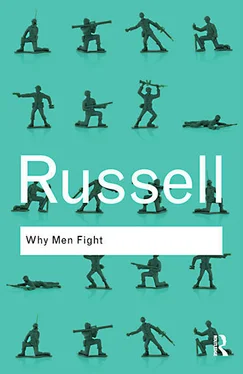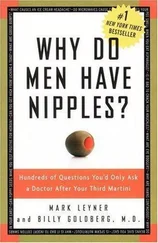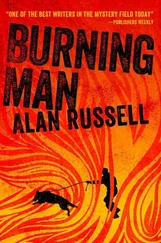Bertrand Russell - Why Men Fight
Здесь есть возможность читать онлайн «Bertrand Russell - Why Men Fight» весь текст электронной книги совершенно бесплатно (целиком полную версию без сокращений). В некоторых случаях можно слушать аудио, скачать через торрент в формате fb2 и присутствует краткое содержание. Город: London, Год выпуска: 2010, ISBN: 2010, Издательство: Routledge, Жанр: Философия, Публицистика, на английском языке. Описание произведения, (предисловие) а так же отзывы посетителей доступны на портале библиотеки ЛибКат.
- Название:Why Men Fight
- Автор:
- Издательство:Routledge
- Жанр:
- Год:2010
- Город:London
- ISBN:978-0-203-86469-2
- Рейтинг книги:3 / 5. Голосов: 1
-
Избранное:Добавить в избранное
- Отзывы:
-
Ваша оценка:
- 60
- 1
- 2
- 3
- 4
- 5
Why Men Fight: краткое содержание, описание и аннотация
Предлагаем к чтению аннотацию, описание, краткое содержание или предисловие (зависит от того, что написал сам автор книги «Why Men Fight»). Если вы не нашли необходимую информацию о книге — напишите в комментариях, мы постараемся отыскать её.
— discusses war, pacifism, reason, impulse and personal liberty, and greatly contributed to Russells fame as a formidable social critic and anti-war activist.
“The supreme principle, both in politics and in private life, should be to promote all that is creative, and so to diminish the impulses and desires that centre around possession.”
Bertrand Russell “Russell is one of the most profound thinkers of the modern age.”
The New York Times
Why Men Fight — читать онлайн бесплатно полную книгу (весь текст) целиком
Ниже представлен текст книги, разбитый по страницам. Система сохранения места последней прочитанной страницы, позволяет с удобством читать онлайн бесплатно книгу «Why Men Fight», без необходимости каждый раз заново искать на чём Вы остановились. Поставьте закладку, и сможете в любой момент перейти на страницу, на которой закончили чтение.
Интервал:
Закладка:
Lay on, Macduff,
And damned be him that first cries, Hold, enough!
But such strength and recklessness of impulse is rare. Most men, when their impulse is strong, succeed in persuading themselves, usually by a subconscious selectiveness of attention, that agreeable consequences will follow from the indulgence of their impulse. Whole philosophies, whole systems of ethical valuation, spring up in this way; they are the embodiment of a kind of thought which is subservient to impulse, which aims at providing a quasi-rational ground for the indulgence of impulse. The only thought which is genuine is that which springs out of the intellectual impulse of curiosity, leading to the desire to know and understand. But most of what passes for thought is inspired by some non-intellectual impulse, and is merely a means of persuading ourselves that we shall not be disappointed or do harm if we indulge this impulse. [7] 1 On this subject compare Bernard Hart’s “Psychology of Insanity” (Cam-bridge University Press, 1914), chap. v, especially pp. 62–5.
When an impulse is restrained, we feel discomfort or even violent pain. We may indulge the impulse in order to escape from this pain, and our action is then one which has a purpose. But the pain only exists because of the impulse, and the impulse itself is directed to an act, not to escaping from the pain of restraining the impulse. The impulse itself remains without a purpose, and the purpose of escaping from pain only arises when the impulse has been momentarily restrained.
Impulse is at the basis of our activity, much more than desire. Desire has its place, but not so large a place as it seems to have. Impulses bring with them a whole train of subservient fictitious desires: they make men feel that they desire the results which will follow from indulging the impulses, and that they are acting for the sake of these results, when in fact their action has no motive outside itself. A man may write a book or paint a picture under the belief that he desires the praise which it will bring him; but as soon as it is finished, if his creative impulse is not exhausted, what he has done grows uninteresting to him, and he begins a new piece of work. What applies to artistic creation applies equally to all that is most vital in our lives: direct impulse is what moves us, and the desires which we think we have are a mere garment for the impulse.
Desire, as opposed to impulse, has, it is true, a large and increasing share in the regulation of men’s lives. Impulse is erratic and anarchical, not easily fitted into a well-regulated system; it may be tolerated in children and artists, but it is not thought proper to men who hope to be taken seriously. Almost all paid work is done from desire, not from impulse: the work itself is more or less irksome, but the payment for it is desired. The serious activities that fill a man’s working hours are, except in a few fortunate individuals, governed mainly by purposes, not by impulses towards those activities. In this hardly anyone sees an evil, because the place of impulse in a satisfactory existence is not recognized.
An impulse, to one who does not share it actually or imaginatively, will always seem to be mad. All impulse is essentially blind, in the sense that it does not spring from any prevision of consequences. The man who does not share the impulse will form a different estimate as to what the consequences will be, and as to whether those that must ensue are desirable. This difference of opinion will seem to be ethical or intellectual, whereas its real basis is a difference of impulse. No genuine agreement will be reached, in such a case, so long as the difference of impulse persists. In all men who have any vigorous life, there are strong impulses such as may seem utterly unreasonable to others. Blind impulses sometimes lead to destruction and death, but at other times they lead to the best things the world contains. Blind impulse is the source of war, but it is also the source of science, and art, and love. It is not the weakening of impulse that is to be desired, but the direction of impulse towards life and growth rather than towards death and decay.
The complete control of impulse by will, which is sometimes preached by moralists, and often enforced by economic necessity, is not really desirable. A life governed by purposes and desires, to the exclusion of impulse, is a tiring life; it exhausts vitality, and leaves a man, in the end, indifferent to the very purposes which he has been trying to achieve. When a whole nation lives in this way, the whole nation tends to become feeble, without enough grasp to recognize and overcome the obstacles to its desires. Industrialism and organization are constantly forcing civilized nations to live more and more by purpose rather than impulse. In the long run such a mode of existence, if it does not dry up the springs of life, produces new impulses, not of the kind which the will has been in the habit of controlling or of which thought is conscious. These new impulses are apt to be worse in their effects than those that have been checked. Excessive discipline, especially when it is imposed from without, often issues in impulses of cruelty and destruction; this is one reason why militarism has a bad effect on national character. Either lack of vitality, or impulses which are oppressive and against life, will almost always result if the spontaneous impulses are not able to find an outlet. A man’s impulses are not fixed from the beginning by his native disposition: within certain wide limits, they are profoundly modified by his circumstances and his way of life. The nature of these modifications ought to be studied, and the results of such study ought to be taken account of in judging the good or harm that is done by political and social institutions.
The war has grown, in the main, out of the life of impulse, not out of reason or desire. There is an impulse of aggression, and an impulse of resistance to aggression. Either may, on occasion, be in accordance with reason, but both are operative in many cases in which they are quite contrary to reason. Each impulse produces a whole harvest of attendant beliefs. The beliefs appropriate to the impulse of aggression may be seen in Bernhardi, or in the early Mohammedan conquerors, or, in full perfection, in the Book of Joshua. There is first of all a conviction of the superior excellence of one’s own group, a certainty that they are in some sense the chosen people. This justifies the feeling that only the good and evil of one’s own group is of real importance, and that the rest of the world is to be regarded merely as material for the triumph or salvation of the higher race. In modern politics this attitude is embodied in imperialism. Europe as a whole has this attitude towards Asia and Africa, and many Germans have this attitude towards the rest of Europe.
Correlative to the impulse of aggression is the impulse of resistance to aggression. This impulse is exemplified in the attitude of the Israelites to the Philistines or of mediæval Europe to the Mohammedans. The beliefs which it produces are beliefs in the peculiar wickedness of those whose aggression is feared, and in the immense value of national customs which they might suppress if they were victorious. When the war broke out, all the reactionaries in England and France began to speak of the danger to democracy, although until that moment they had opposed democracy with all their strength. They were not insincere in so speaking: the impulse of resistance to Germany made them value whatever was endangered by the German attack. They loved democracy because they hated Germany; but they thought they hated Germany because they loved democracy.
The correlative impulses of aggression and resistance to aggression have both been operative in all the countries engaged in the war. Those who have not been dominated by one or other of these impulses may be roughly divided into three classes. There are, first, men whose national sentiment is antagonistic to the State to which they are subject. This class includes some Irish, Poles, Finns, Jews, and other members of oppressed nations. From our point of view, these men may be omitted from our consideration, since they have the same impulsive nature as those whofight, and differ merely in external circumstances.
Читать дальшеИнтервал:
Закладка:
Похожие книги на «Why Men Fight»
Представляем Вашему вниманию похожие книги на «Why Men Fight» списком для выбора. Мы отобрали схожую по названию и смыслу литературу в надежде предоставить читателям больше вариантов отыскать новые, интересные, ещё непрочитанные произведения.
Обсуждение, отзывы о книге «Why Men Fight» и просто собственные мнения читателей. Оставьте ваши комментарии, напишите, что Вы думаете о произведении, его смысле или главных героях. Укажите что конкретно понравилось, а что нет, и почему Вы так считаете.












